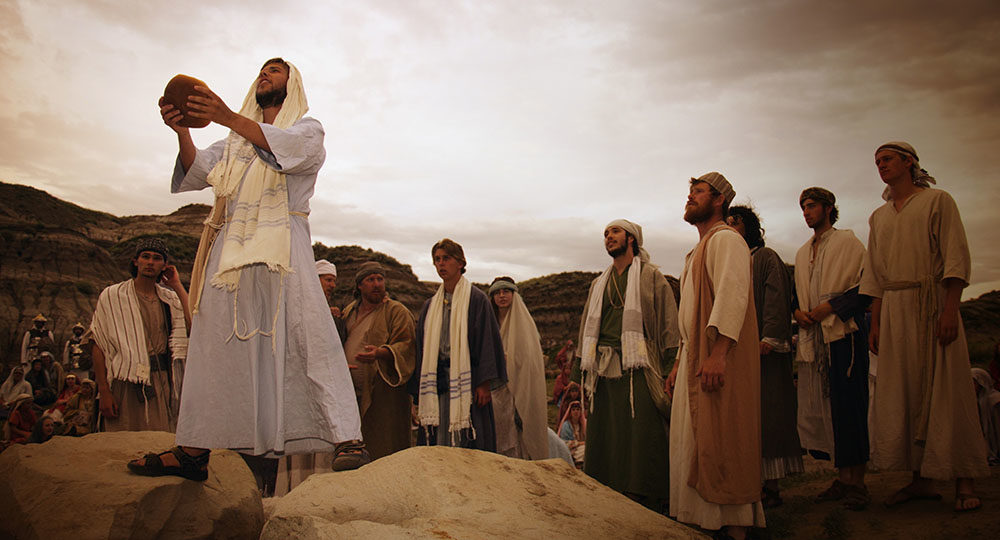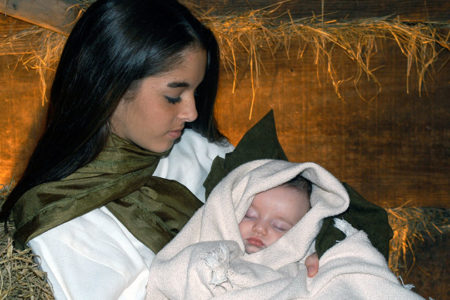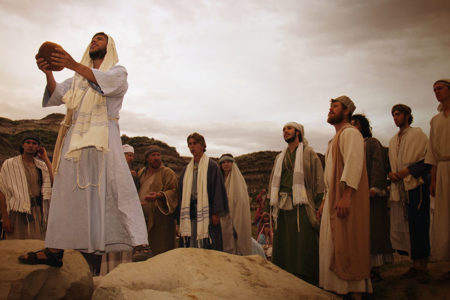The One Deuteronomy 18:15–22
“He is the one.” That was the conclusion of Morpheus concerning Neo in the fictional story The Matrix. Morpheus believed the prophecy of the one who would come to save an enslaved humanity in a computerized world called the Matrix. And he was right.
During the last U.S. presidential campaign, many “experts” dubbed Barack Obama “the one.” Some attributed godlike, messianic qualities to him. Others, such as an editorial writer for the Danish newspaper Politiken, called Obama “the practical savior of our times,” declaring, “Obama is, of course, greater than Jesus.”1 We, of course, disagree.
Looking for “the one” is not a practice confined to theatre or politics. Almost immediately after the fall of man, God promised someone would come. Beginning with the seed of the woman in Genesis 3:15, numerous Scriptures point to “the One”—the Anointed, the Messiah of Israel. He would be the ultimate Redeemer of mankind, able to transform a world ravaged by sin into a glorious, everlasting Kingdom. Such a one is the hope of many Jewish people and Christians today.
Who Is Like Moses?
As the Jewish people approached their 400th year as slaves in Egypt, a Jewish baby was born among them. He was named Moses and was miraculously kept safe by the daughter of the very Pharaoh who had ordered the murder of all newborn Jewish boys.
Moses grew to become “the one” who led his people out of slavery. Other prophets came after him, but none would have his prestige. They served the Lord faithfully and heard God speak to them in dreams and visions, but only Moses spoke to God “face to face” (Num. 12:6–8).
Moses climbed to the peak of Mount Sinai to receive God’s commandments and was forced to cover his face to shield his people from gazing at the glory of God that rested on it. Most Jewish people regard Moses as the greatest of all prophets; and some even suggest he is “the one” promised, the Messiah Himself.
As great as Moses was, however, Scripture does not teach he is the Messiah. He was a great prophet, lawgiver, and deliverer. Yet One was to come who would be like Moses. As Moses wrote in Deuteronomy 18:15–22:
The Lᴏʀᴅ your God will raise up for you a Prophet like me from your midst, from your brethren. Him you shall hear, according to all you desired of the Lᴏʀᴅ your God in Horeb in the day of the assembly, saying, “Let me not hear again the voice of the Lᴏʀᴅ my God, nor let me see this great fire anymore, lest I die.” And the Lᴏʀᴅ said to me: “What they have spoken is good. I will raise up for them a Prophet like you from among their brethren, and will put My words in His mouth, and He shall speak to them all that I command Him. And it shall be that whoever will not hear My words, which He speaks in My name, I will require it of him. But the prophet who presumes to speak a word in My name, which I have not commanded him to speak, or who speaks in the name of other gods, that prophet shall die.” And if you say in your heart, “How shall we know the word which the Lᴏʀᴅ has not spoken?”—when a prophet speaks in the name of the Lᴏʀᴅ, if the thing does not happen or come to pass, that is the thing which the Lᴏʀᴅ has not spoken; the prophet has spoken it presumptuously; you shall not be afraid of him.
The passage, which clearly describes the One whom God would raise up, brought hope to the Jewish heart concerning the Messiah. It indicates the Messiah must:
- Be Jewish (v. 15).
- Be raised up by God (v. 15).
- Be heeded. People must obey Him or receive judgment (vv. 15, 20). When Pharaoh did not listen to Moses, he and his people were punished.
- Speak God’s words (v. 18). He is not a pundit providing expert opinion but, rather, God’s opinion.
- Be error-free in His predictions (vv. 21–22). He must be correct 100 percent of the time.
- Be like Moses, who met all these requirements and thus qualified as a prophet of God (Num. 12:6–8). He also was a redeemer of his people Israel (Ex. 3:10), a mediator between his people and God (20:18–21), and an intercessor on their behalf (chap. 32).
High Expectancy
Messianic expectancy was high in the first century A.D. Out of the wilderness came a fiery John the Baptist who caused such a stir the Jewish leaders sent a delegation to ask him if he was the Messiah, Elijah, or the prophet of Deuteronomy 18:15. He denied being any of the three but said he was preparing the way for “the One” to come. So the search for the One intensified (Jn. 1:19–23).
Shortly afterward, Jesus came on the scene. Early in His ministry He took meager bits of fish and bread and fed 5,000 men (6:11–12). As His disciples collected the leftovers, their thoughts no doubt turned to Moses and the miraculous feeding of the Israelites with manna from heaven.
“This is truly the Prophet who is to come into the world,” they said (v. 14). Calling Him “the Prophet” was the acknowledgment of Him as the One described in Deuteronomy 18:15.
After all, like Moses, Jesus was Jewish. Like Moses, He proclaimed God’s words to His people. Like Moses, He authenticated His ministry with many miracles. No doubt, many wondered, “Is Jesus the One?”
Near the end of His earthly ministry, Jesus turned to His most trusted companions, His disciples, and asked, “Who do men say that I, the Son of Man, am?” (Mt. 16:13).
“Some say John the Baptist, some Elijah, and others Jeremiah or one of the prophets,” they answered (v. 14).
“Who do you say that I am?” Jesus asked (v. 15). Peter, enabled by the power of God, alone responded, “You are the Christ, the Son of the living God” (v. 16).
Peter recognized the One. He knew Jesus not only was like Moses, He was superior to Moses (Heb. 3:3). Jesus was the One of Deuteronomy 18:15–22. He not only was the Prophet to come but also the One to fulfill God’s redemptive plan for mankind.
After Jesus’ resurrection and ascension, Peter quoted the Deuteronomy passage when he preached in Jerusalem. As “sons of the prophets, and of the covenant which God made with [their] fathers” (Acts 3:25), they all should have recognized Jesus as the One who came as their Messiah and Savior.
He was the Prophet in word and deed. Jesus was “the One.”
ENDNOTES
- “Editorial: Obama greater than Jesus,” Politiken, December 28, 2009 <politiken.dk/newsinenglish/article868683.ece>.







